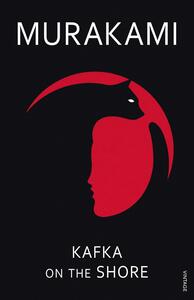Take a photo of a barcode or cover
Absolutely gross and not redeeming. My discord friends agree so nope, out of here you go.
Talking cats, Colonel Sanders cameos, leeches raining from the sky. A weird book. But an enjoyable one.
4.25 stars. I really liked the plot and devoured the book. Everything about the book is perfect expect the female characters, that one overly graphic scene (if you love cats and are sensitive to animal cruelty, skip the middle of Chapter 16) and the frequent mention of sex and penises.
Maybe I went into this book with a preconceived disdain for the way Murakami writes female characters. I've heard a lot of discourse on this topic and tried to ignore it for a while. It confuses me because Murakami's ability to describe things is amazing, yet every female character in this novel is defined by their looks (even Ms. Saeki's looks are frequently described as "xyz for her age" despite her being an integral part of the story).
The scene in Chapter 16 was much too in detail for what it was worth. This may just be due to Murakami's descriptive style or an unnecessary overdoing of a shock value scene.
New drinking game: take a shot everytime a penis or sexual act is mentioned. I am by no means a prude, but sexual depictions in literature make me squirm. I get Kafka is a 15-year-old boy and those kind of fantasies are par for the course, and that there is an Oedipean thing going on, but something about the way Murakami writes sex is just repulsive. Despite coming from the perspective of a teenage boy, the commentary on women comes across as that of a perverted old man (sorry Murakami).
Overall, the plot was amazing and kept me engaged the entire time. I do want to read more Murakami and hope I can get over my gripes with this narrative style.
Maybe I went into this book with a preconceived disdain for the way Murakami writes female characters. I've heard a lot of discourse on this topic and tried to ignore it for a while. It confuses me because Murakami's ability to describe things is amazing, yet every female character in this novel is defined by their looks (even Ms. Saeki's looks are frequently described as "xyz for her age" despite her being an integral part of the story).
The scene in Chapter 16 was much too in detail for what it was worth. This may just be due to Murakami's descriptive style or an unnecessary overdoing of a shock value scene.
New drinking game: take a shot everytime a penis or sexual act is mentioned. I am by no means a prude, but sexual depictions in literature make me squirm. I get Kafka is a 15-year-old boy and those kind of fantasies are par for the course, and that there is an Oedipean thing going on, but something about the way Murakami writes sex is just repulsive. Despite coming from the perspective of a teenage boy, the commentary on women comes across as that of a perverted old man (sorry Murakami).
Overall, the plot was amazing and kept me engaged the entire time. I do want to read more Murakami and hope I can get over my gripes with this narrative style.
“Eli, devi assolutamente leggere questo libro! È uno dei miei romanzi preferiti, mi ci rispecchio tantissimo e dal momento che io e te siamo uguali penso lo amerai”, mi ha detto a inizio luglio la mia persona preferita, e così è stato. Dire che ho amato quest’opera di Murakami in realtà è riduttivo: leggerla è stato un viaggio che mi ha profondamente cambiata, mi ha fatta crescere, mi ha arricchita e quando qualcosa ha un impatto tanto forte sulla nostra persona penso davvero che il verbo “amare” sia riduttivo; provo un’infinita gratitudine nei confronti di questo libro.
Non sono stata costante nella lettura, specialmente all’inizio, ho faticato a entrare in sintonia con la storia, continuavo a chiedermi dove volesse andare a parare, mi sembrava terribilmente assurda e surreale, ma ad un certo punto sono arrivata a comprendere che era inutile e scorretto pormi continuamente domande e soprattutto aspettarmi delle risposte, che per apprezzare e soprattutto capire a pieno questo romanzo avrei dovuto accoglierlo così com’era, lasciarmi accompagnare senza fermarmi a ogni metro guardandolo storto perché non vedevo e non capivo dove volesse condurmi, e grazie alla scrittura semplice, ma mai banale, e scorrevole di Murakami sono riuscita a procedere fino a giungere a questa consapevolezza.
Si tratta di un romanzo di formazione profondamente onirico e metaforico, nel quale sogno e realtà si confondono al punto da immergere il lettore in una sorta di dimensione senza tempo né spazio, la stessa in cui vivono Tamura Kafka, un quindicenne che, abbandonato dalla madre e vittima di una maledizione lanciatagli dal padre, decide di scappare di casa intraprendendo un viaggio che gli permetterà di conoscere se stesso, e Nakata, un anziano signore dalle capacità cognitive limitate e dalla visione del mondo del tutto originale.
Tamura e Nakata, così come tutti gli altri personaggi “secondari”, che secondari non sono affatto in realtà, mi sono entrati profondamente nel cuore: leggendo questo libro ho riso, ho pianto, ho provato rabbia, dolore, incredulità, mi sono fatta tantissime domande e, attraverso le parole di Murakami, ho tratto le mie risposte. Penso sia un libro da leggere assolutamente, ma anche da rileggere a distanza di tempo e io vorrei davvero dimenticarlo per rileggerlo di nuovo come se fosse la prima volta a distanza di tempo e vedere che effetto mi fa.
Non sono stata costante nella lettura, specialmente all’inizio, ho faticato a entrare in sintonia con la storia, continuavo a chiedermi dove volesse andare a parare, mi sembrava terribilmente assurda e surreale, ma ad un certo punto sono arrivata a comprendere che era inutile e scorretto pormi continuamente domande e soprattutto aspettarmi delle risposte, che per apprezzare e soprattutto capire a pieno questo romanzo avrei dovuto accoglierlo così com’era, lasciarmi accompagnare senza fermarmi a ogni metro guardandolo storto perché non vedevo e non capivo dove volesse condurmi, e grazie alla scrittura semplice, ma mai banale, e scorrevole di Murakami sono riuscita a procedere fino a giungere a questa consapevolezza.
Si tratta di un romanzo di formazione profondamente onirico e metaforico, nel quale sogno e realtà si confondono al punto da immergere il lettore in una sorta di dimensione senza tempo né spazio, la stessa in cui vivono Tamura Kafka, un quindicenne che, abbandonato dalla madre e vittima di una maledizione lanciatagli dal padre, decide di scappare di casa intraprendendo un viaggio che gli permetterà di conoscere se stesso, e Nakata, un anziano signore dalle capacità cognitive limitate e dalla visione del mondo del tutto originale.
Tamura e Nakata, così come tutti gli altri personaggi “secondari”, che secondari non sono affatto in realtà, mi sono entrati profondamente nel cuore: leggendo questo libro ho riso, ho pianto, ho provato rabbia, dolore, incredulità, mi sono fatta tantissime domande e, attraverso le parole di Murakami, ho tratto le mie risposte. Penso sia un libro da leggere assolutamente, ma anche da rileggere a distanza di tempo e io vorrei davvero dimenticarlo per rileggerlo di nuovo come se fosse la prima volta a distanza di tempo e vedere che effetto mi fa.
dark
emotional
mysterious
reflective
relaxing
sad
slow-paced
Plot or Character Driven:
Character
Strong character development:
Yes
Loveable characters:
No
Diverse cast of characters:
Yes
Flaws of characters a main focus:
Yes
Minor: Animal cruelty
adventurous
dark
mysterious
reflective
slow-paced
Plot or Character Driven:
Character
Strong character development:
Yes
Loveable characters:
Yes
Diverse cast of characters:
Yes
Flaws of characters a main focus:
Yes
არ ვიცი მურაკამიზე რომ ვწერ არ მინდა რაიმე ცუდი ვთქვა, მაგრამ ვერც კარგ სიტყვებს ვიმეტებ. მურაკამი არასდროს არ წერს რაიმე ახალს(ამის საფუძველი მხოლოდ ორი ნაწარმოებია ნორვეგიული ტყე და კაფკა), უბრალოდ ახალ ინტერპრეტაციებს გვთავაზობს. გაქცევა, საკუთარი თავის ძიება, ინდივიდუალური დამოკიდებულებების, შეხედულებების ძიება, მამის ხატის დამხობა, რათა საკუთარი თავი დაინახო, მოზარდობის ყველაზე მნიშვნელოვან კითხვებზე პასუხი იპოვო. კაფკას თავისი მდგომარეობის გააზრებაში, დაგროვილ კითხვებზე პასუხების გაცემაში ლიტერატურა და მუსიკა ეხმარება, მაგრამ ყველაზე მთავარი პრაქტიკული გამოცდილებების მიღებაა, რადგან თუ არ გაიქცევი ვერ მიხვდები, რომ ყველაფრის აზრი დაბრუნებაშია. ჩემი აზრით გზაზე შეხვედრილი პერსონაჟები მურაკამიმ გამოიყენა იმისთვის რომ ეჩვენებინა კაფკაში დამოკიდებულებების ჩამოყალიბების პროცესი და ამ ქაოსში საკუთარი მდგომარეობის მიგნების ისტორია. ისინი განსხვავებულები არიან, განსხვავებული გზებით, შეხედულებებით და კაფკა იგებს როგორია სამყარო, თავგადასავალი სრულდება და გაღვიძების შემდეგ კაფკა აუცილებლად მიხვდება რომ ყველაფერი სხვაგვარად გაგრძელდება. კიდევ ერთს დავწერ იმიტომ რომ ბევრი სისულელე დავწერე საოცრად მოხიბლული ვარ ნაკატას პერსონაჟით, მხოლოდ მის გამო არ ვნანობ ამ ნაწარმოების წაკითხვას და კიდევ ერთი ძლიერი მხარე ნორვეგიულ ტყეს მაინც ჯობს, სხვა თუ არაფერი. მაგრამ მიუხედავად ყველაფრისა მერე რა? :/
challenging
emotional
mysterious
reflective
tense
slow-paced
Plot or Character Driven:
A mix
Strong character development:
Yes
Loveable characters:
Complicated
Diverse cast of characters:
Yes
Flaws of characters a main focus:
Complicated
mysterious
medium-paced
Plot or Character Driven:
A mix
Strong character development:
Yes
Loveable characters:
N/A
Diverse cast of characters:
Yes
Flaws of characters a main focus:
N/A



